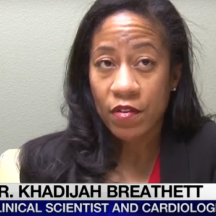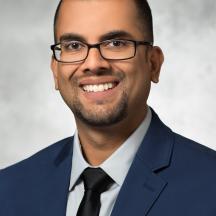In The News
07/31/2019
BCVS Council Vice Chair Beth McNally and BCVS 2019 Co-Chair Jil Tardiff interview Keynote Lecturer Christine Seidman about her recent work on the genetics of dilated and hypertrophic cardiomyopathy and how it might be harnessed to develop new, earlier treatments.
05/07/2019
Dr. Nancy Sweitzer, who coped with the death of her husband, Kurt, while raising two children and becoming director of the UA Sarver Heart Center, is being honored as one of Tu Nidito's Remarkable Moms.
04/22/2019
Ariel Shirley, a graduating senior at the University of Arizona Mel & Enid Zuckerman College of Public Health who completed an internship focused on community education at the UA Sarver Heart Center, writes about the importance of running in the Diné (Navajo) culture.
03/29/2019
Even people who believe they're blind to another person's color carry unintentional bias. Dr. Khadijah Breathett gives advice to doctors who want to be aware of their biases and how to overcome these.
01/03/2019
Jared Churko, PhD, assistant professor, Cellular and Molecular Medicine, spoke with Leslie Tolbert, PhD, regents professor emerita, Neuroscience at the University of Arizona, about using iPS cells to study patient-specific diseases, test drugs most likely to work on a given patient, and even replace diseased tissues.
10/11/2018
The University of Arizona Structural Heart Disease Program team at Banner – University Medical Center Tucson, led by Kapil Lotun, MD, reached another milestone last week in completing the first-ever transcatheter aortic valve replacement (TAVR) procedure on a patient with a bicuspid aortic valve utilizing only transesophageal echocardiography (TEE) to guide them. The procedure also was unique in that only a minimum of contrast dye was employed in final diagnoses preparations for the procedure and no CT (computed tomography) scan was used at all.
10/11/2018
If you had a “silent” heart attack and didn’t know it, does it matter? Tushar Acharya, MD, assistant professor of medicine, and colleagues of the National Heart, Lung, Blood Institute of the National Institutes of Health, called unrecognized myocardial infarctions (MI) “an underappreciated public health problem.” The research team found that the combined risk of death, a subsequent nonfatal heart attack, and heart failure were similar at a 10-year follow up for both recognized and unrecognized MI. The unrecognized MIs were identified using cardiac magnetic resonance (CMR).
08/31/2018
Dr. Khadijah Breathett, MD, MS, FACC a Black female advanced heart failure/transplant cardiologist can’t remember how many times her Black friends have lamented to her about the body mass index (BMI). “I show my patients and community members maps of obesity over the decades, and we have been getting wider. Just look at photos of your great and great-great grandparents and their more slender physiques: we have been getting wider overtime.”
07/25/2018
Implantation of ventricular assist devices rose between 2012 and 2015 in black patients with advanced HF, indicating that racial disparities in VAD treatment may be narrowing, according to Khadijah Breathett, MD, MS, and colleagues, who wrote an article published in Cardiology Today.
04/30/2018
Very few physicians or patients enter an exam or hospital room with the intent of racially alienating the other person in the room, but research demonstrates that minority populations, particularly African American and Hispanic patients, receive unequal care compared to white patients.











